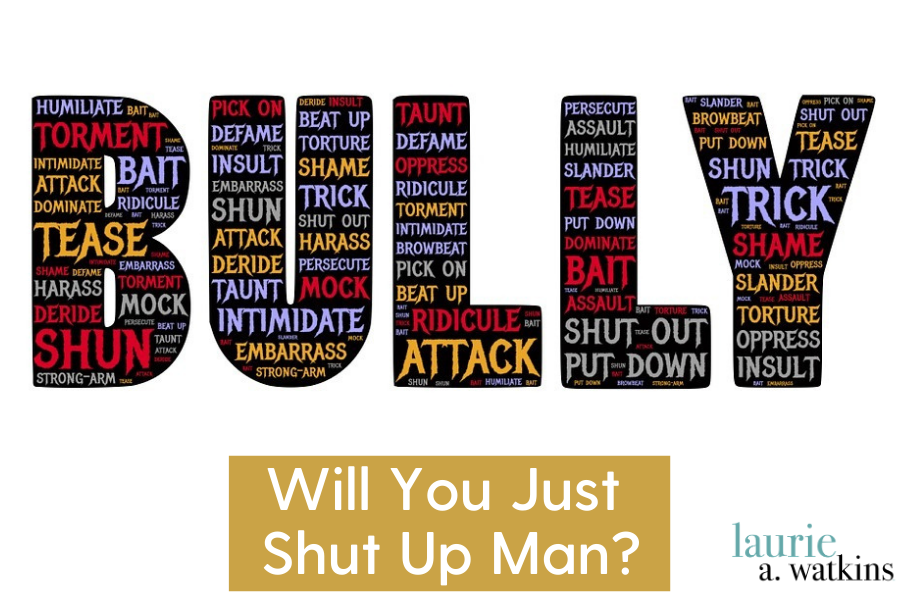When I say the word “bully” what do you think of? Is it a schoolyard situation? Maybe a flashback to high school? We are learning more and more that bullying can even happen in adult interactions. Bullying in children can lead to anxiety, depression, low self-esteem, and fear. Adult bullying can also illicit all of these emotions.
Adult bullies can also use the same strategies as childhood bullies: fear, intimidation, exclusion, and harassment. One of the largest differences is adults are more developed both physically and mentally so can usually use more sly tactics. Adult bullies can even be motivated by the same factors as childhood bullies: a need to compensate for a sense of powerlessness or lack of control.
Most of us can act like a jerk sometimes. Today’s world is extremely stressful. A workaholic culture and a sleep deprivation epidemic can make everyone on edge at times. The occasional incident can usually be OK and forgiven. It is when it becomes a habit that it is an issue.
We all recently witnessed a very public display of adult bullying. The first presidential debate included extreme verbal bullying from Donald Trump towards Joe Biden. Especially his negative remarks about Joe Biden’s children. Also, the continuous interruptions and speaking over the moderator, Chris Wallace. It truly brought up how I have felt multiple times in meetings. Women tend to be silenced in a group of men.
There are a variety of types of bullies you may encounter in your life:
Tangible Bully. These bullies use their formal power like being a boss or executive, or material power like financial control to intimidate others.
Verbal Bully. This bully uses words like criticism or teasing. This can include racist, sexist, and/or homophobic language.
Passive-Aggressive Bully. This person appears nice on the surface; yet also knows how to hit where it hurts. Gossip, jokes at other’s expense, and rude faces are some examples.
Physical Bully. This bully can raise fists, throw objects, and do more dangerous acts. If you are the victim of a physical bully please call 911. The National Domestic Violence Hotline can be reached at 1-800-799-7233. The National Sexual Assault Hotline can be reached at 1-800-656-4673.
Cyber Bully. This is a HUGE issue. Even adults can be victims of harassing texts, emails, and social media. This type is unique in that cyber bullies can reach their victims any time, day or night.
All of these types of bullying can cause significant emotional and psychological distress. Being bullied can lead to a lifetime of low self-esteem. The main cause of an adult bully is someone who was bullied as a child. Chronic fatigue, insomnia, and poor performance at work or school are all results of bullying.
The Cyberbullying Research Center says that nearly 20% of cyberbullying victims can experience suicidal thoughts. Statista, who specialize in market and consumer data, claim that as of January 2020, 44% of American adults report online abuse (name calling, embarrassment, harassment, physical threats, stalking, etc.).
Here are some techniques to use to help combat the adult bullies in your life:
Avoidance. It is much harder to avoid childhood bullies. We are not able to stop attending school. As adults, we may not be able to tell the teacher, but we can dictate how we spend our time. It is sometimes easy to ask to be placed on a different project or say no to social situations that include this person.
Be assertive. Try to keep your emotions in check and clearly explain what they are doing, how it is affecting you, and what changes you would like to see.
Ignore. Bullies tend to be driven by power. Many times, they get this power from a reaction. If a bully does not get the reaction they are looking for, sometimes it removes the reason or benefit for the bullying. If a bully is making jokes at your expense, laugh along with them. If a bully is sarcastic with their compliments, simply thank them. Ignore rude comments.
Talk to someone. It is not a sign of weakness to reach out for help. Some battles just can’t be fought alone. You can always anonymously speak to HR if it’s a workplace issue or even a counselor.
No one is immune to bullying. If you find yourself acting in a way that you wouldn’t enjoy being treated, be sure to take some time to reevaluate how you behave. There is no weakness in apologizing. There is also no weakness in forgiveness if you need to forgive a bully.
We should have people in office that are good examples of behavior for ourselves and future generations. Voting in this election is imperative. Let’s have someone as the face of this country that we can be proud of. Not a bully.






